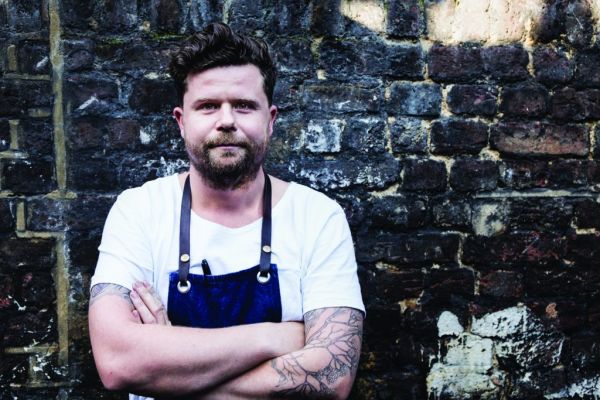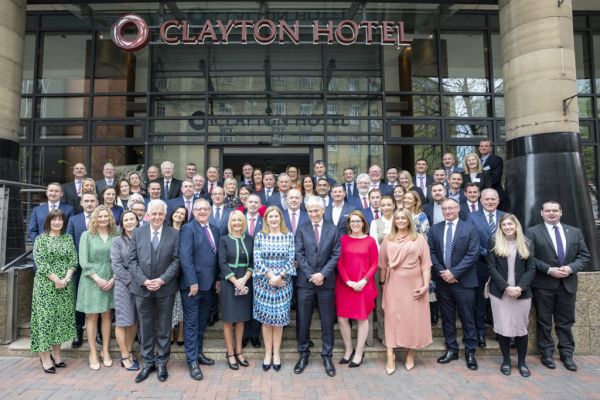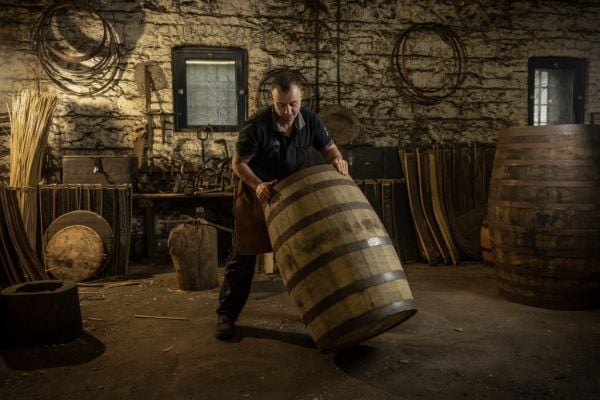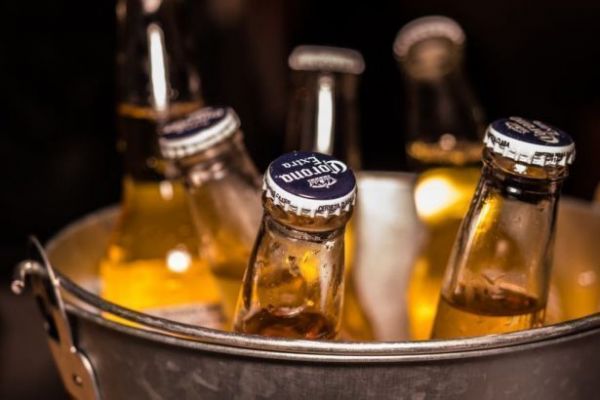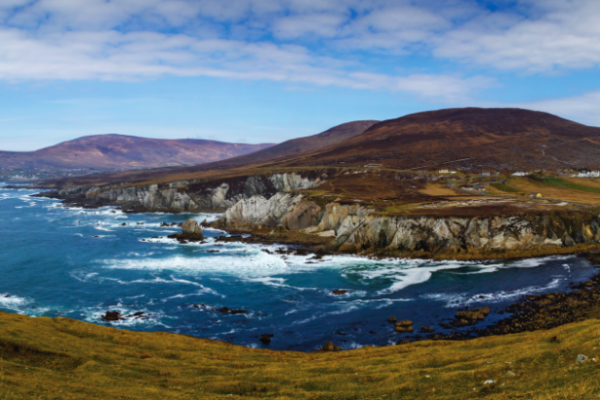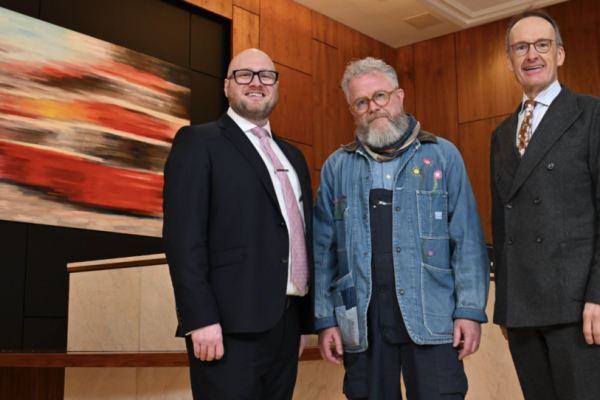Robin Gill is one of the most exciting chefs to come out of Ireland. His original restaurant, The Dairy in Clapham, has been followed by three more and he is known for his constant creative innovation around food and cooking, as well as for judging Celebrity Masterchef. Hospitality Ireland's Emily Hourican spoke to him.
The day I meet Robin Gill, chef and owner of The Dairy Clapham, The Manor, Paradise Garage and Counter Culture, as well as judge of Celebrity Masterchef, he is busy prepping in the kitchens of Chapter One, alongside Ross Lewis.
The two are hosting lunch the next day, showcasing some of the remarkable and underused produce of our coastline. Gill tells me about eel, caught in Lough Neagh, smoked and set directly to London. About seaweed and cuts of fish that are highly prized elsewhere but discounted in Ireland. The purpose of the lunch is to get the story out – we have more wonderful produce even than we know – but also, as Gill says, for himself, his relationship with Ireland, the profile of his restaurants, and what the Americans like to call ‘personal development.’
“I want to try and come back a bit more often, and cook more often in other restaurants. Chefs, 10 years ago, did their own thing, there was less collaboration than there is now. I think the new way is good. I do a lot of charity stuff as well. It’s fun, it’s worthwhile, but also, it’s important to get out, to have something else on the go. This year, nearly every month, there’s something going on – I’m off to Finland, to Iceland, down to Brighton for a night.”
He is, he says, lucky in that he has a great team.
“I don’t need to be in the kitchen doing 90 hours a week. I do 60, so I’m still working, I’m there – but when I’m not, the kitchen runs without me, so I can afford to go and spread the word a little bit.”
Why does it matter so much to him, to spread the word?
“I have a big fear,” he laughs. “We’ve been in the limelight now coming into our fourth year, and I have this big fear that no one is going to want to come into the restaurant any more all of a sudden. That we will no longer be flavour of the month. I worked for Raymond Blanc for many years, and if you look at what he’s achieved, and how he’s put himself out there, that’s been a massive influence on me. You see the amount of work he does, whether it’s TV, articles, collaborative dinners, he does the Wilderness Festival, and he’s 60-something. I think he has that same fear.”
GETTING WORD OUT
PR is something Gill takes seriously, and something that he and his team take charge of in-house, just as they do with their baking and meat-curing.
“I’ve never really worked with a PR company,” Gill says. “Most of the time, I feel we’ve got to do it all in-house, and events like this are a way of doing that – of getting out there, getting the word out, seeing different kitchens, experiencing different chefs. And if I can combine that with coming home, seeing my family and my friends a little bit – great!”
So how important is it to keep a balance between regular diners, the ones who come back again and again, and a steady influx of new customers?
“We have a high proportion of regulars who come in twice a month, but we also have a stupid amount of people coming for the first time. We seem to be on the radar. We’ve managed to get great publicity, which is amazing, because we’re not central London – we’re Clapham, which has never really been known for great food. So we’re just really fortunate.”
Fortunate is one word for it, although hard work, talent and vision are a big part of the mix. Did he expect anything like the level of attention when he started off?
“God no. I thought that the area we’re in, Clapham, had a good enough demographic and was a busy enough area that we could run a nice little business here, and that we could fill it most evenings. I didn’t think we would be known outside of South-West London. But somehow, it’s gone pretty much global.”
What does he think captured people’s imaginations?
“It’s a little bit of everything. We put a lot of work and effort into the real backbone of the place – we make our own charcuterie, we’ve always made our own bread, now we make four or five different types, we do a lot of fermentation, we have the bees and make our own honey. When you come and eat in the restaurant, you’re getting really beautiful food, made with old and forgotten techniques, so everything is very tasty, but it’s also fun. There’s music playing – hip-hop at lunch, disco in the evenings – so it’s a really good package. It’s good value, busy, loud, and fun. It’s small, we do 70 covers every week-night, and 80-85 on Fridays and Saturdays. There’s a great atmosphere along with nice food, so you’re going there for an experience. It feels like a party every night. The energy of the place is phenomenal, which is down to the energy of the team. If it was a great big restaurant with high ceilings, I don’t think we’d capture the kind of intimacy we have.”
How much does he think diners really care about the origin of their food – where and how it is sourced?
“People do care about what they eat and where it comes from,” he says. “Seven or eight years ago, when restaurants started putting the names of farms on their menus, that instantly put customers at ease – even though the customers wouldn’t have known the farms. Now what you have is customers who do know the farms, or the suppliers, because they are seeing them on different menus. There is far more sharing of information among chefs now. There are collectives of chefs buying from one supplier, one farmer or butcher, and suddenly customers know all about these suppliers. Now, what you have even is customers also buying from some of these suppliers.”
This is an idea Gill is interested in. From a number of perspectives.
“We might look into starting an initiative where staff can all buy from our suppliers, so they get better quality meat and fish. They set up their own accounts with the suppliers, so you’re giving the suppliers more business – even if the staff are only buying for one family once a week – if you’ve got 20 staff, it builds up. And we’re thinking of doing this with customers as well. So that when they have dinner parties or whatever, if they want to do something at home – they can buy the same meat. It’s about building a relationship with customers, linking it all together. That’s an example of how you keep customer loyalty, by doing little things like that.”
Another idea Gill has on the boil is equally interesting, based around the same ideas of loyalty, traceability, sustainability, that so clearly motivate him.
“We’re working with a guy who is distributing food bins containing an enzyme that breaks the food down rapidly, and naturally, and turns it into the most amazing compost. This means we dispose of food waste, but pay less than the usual disposal methods – Where does food waste usually go? Into landfills usually, mixed up and contaminated with other kinds of waste. And the guy is now linking us with farmers close to us in London who don’t have the best soil. The idea is that they re-fertilise the soil with the compost, we pay the farmer a salary and buy all the seeds, then, when things start to grow, we receive our own vegetables straight from our own farm, without actually buying any land. It’s completely innovative. We’re pretty sure that it will cost us less at the end of the day. There will be an upfront investment, but ultimately, this will save us money. And what an amazing thing to be able to say? These vegetables come from what is pretty much our farm?”
BREXIT
Given the fast-pace of Gill’s restaurant openings so far – five in four years – what is currently in the pipeline?
“Actually, I’d like to consolidate and see what we have,” he says. “We have moved quite quickly. We were a year and a half in The Dairy, then we opened the Manor, then Paradise Garage, then the deli and that didn’t really work so we flipped it into Counter Culture. So we’ve opened five places in the last four years. It’s been full-on, and it’s all going very well, but with the climate in London right now, I’m not as confident as I was. It’s that word – Brexit – that’s a little bit terrifying.”
How does he think it will affect him personally?
“I guess there’s always going to be close ties between Britain and Ireland. We all presume that being Irish in Britain will be more or less the same as being British, so I’m not hugely concerned about that, but I am concerned about the other nationalities – Germans, French, Spanish, who work in our businesses. Only 5-10% of our employees are British, the rest are from all over – Italian, Spanish, Polish, Latvian. What happens to them? That’s the biggest concern for the moment.
"So far, we haven’t seen any negative impact. The pound has dropped so there has been an influx of tourism, which is good for the hospitality sector. We haven’t noticed a decrease in business, but there isn’t a restaurateur out there that isn’t concerned. We don’t know what is going to happen, but we know something is. And so, I’m feeling now that we should stop, consolidate, make sure that what we’re doing is the very best it can be. Ask ourselves, can we improve things? There is so much work still to be done – the farm project, that’s a new thing to get right. Counter Culture, our latest thing, has been hugely successful and that is something that could be replicated.”
Would he consider opening something here in Dublin?
“We could open a Counter Culture here, and that is something I would certainly think about. I’d love to do something like that. We’re trying to capture the atmosphere of a San Sebastian pinchos bar, but with our particular style of food: lots of meats – I’m big into my charcuterie – different breads, but also more modern cooking with different flavours, something that changes all the time.
“I’d nearly be more confident opening in Dublin at the moment than in London. It is great to see the types of restaurants opening in Dublin now, and the quality of the cooking. There have always been wonderful restaurants like Chapter One and Guilbaud’s, but now in the more mid-market range, to see places like Forest Avenue, Mr Fox, really affordable places like Juniors and The Old Spot. Who would ever have thought Blackrock Market would have a Michelin Star restaurant? It’s an interesting time.”
FUTURE INVESTMENT
Gill has spoken out previously about the kind of macho, bullying culture that can exist in restaurant kitchens. Does he think this is still a problem within the industry?
“It still happens,” he says, “but less, and often now it is where chefs might be isolated, stuck in the middle of nowhere, even with personal issues. There is still a lot of pressure in this industry, and sometimes people are going to explode, but there is less and less of that kind of thing. It’s not acceptable. And with the shortage of chefs there is now, you can’t afford to treat them badly. You need to train them, give them a reason to be there – they need to feel they are learning more, that menus are changing more often, they need to feel inspired, you need to get them involved in what’s being done – that’s how I keep my guys.”
Within Gill’s restaurants, it is, he says, “a collaborative. We have meetings all the time and we encourage everyone to come with ideas: Where did you eat? What did you have? What did you see? If people go into a kitchen and it’s not an encouraging place, if it’s aggressive and belittling, they are going to leave. And that’s one reason why the industry is in the state it’s in.”
And yet, he can also see issues with the kinds of expectations many young chefs now have around their career progression.
“Because so many restaurants are opening left, right and centre, young guys can go in, cook for two years, and suddenly they are looking for a junior sous position, and £35,000 a year, and they are getting it. People are paying them that. I took my first head chef role after 10 years of being in a kitchen. I had earned my stripes. And it was 12-15 years before I opened my own business. People think this can happen overnight. It can’t. Guys who have worked for three or four years think they can do this – that’s a negative.”
“I took a dip in salary every new place I went to,” he continues. “Because I saw it as an investment – that I was being paid to learn. A lot of my friends were going to university and getting big loans so they could afford to live. Then they were starting their careers with a debt of £40-50,000. Wherever I went, it was an apprenticeship. Yes it was low money, but at least I was getting something for it.”
Of course, Gill’s route to the kitchen was an interesting, almost an accidental one.
“I failed at everything else, basically,” is how he puts it with a laugh. “I didn’t apply myself at school. I had fun instead. Then I convinced my parents to pay for me to repeat my Leaving before I even sat it. I went to the Institute – a mixed school, in the centre of town, beside a whole lot of pubs… it didn’t work out the way I had thought! Half-way through, I felt an extreme amount of guilt – ‘what am I doing?’ – and a strong need to apply myself properly to something. Everything I had taken on at that stage, I had given up – music, anything I was given the opportunity to do, I didn’t stick with it. I finally felt, this is not good. My plan was to get my Leaving, get into UCD, and to be honest, I was going to f**k around there for another three years, and have fun. I had no idea what I would do after that. I realised – this can’t happen. I want something I can be proud of, that I can work towards.”
And so he got himself an apprenticeship with an electrician, through a friend, and told his parents he was dropping out of the Institute. By then, he had been cooking at home for years, he had friends who were cooking, his aunt had a farm, his brother was the manager of a restaurant – food was all around him. So when he told his parents about the apprenticeship, “they looked at me blankly and said ‘you’ve barely even changed a light-bulb, what are you on about … ?’ Instead, cooking was their suggestion, and I was just happy to please them.”
Gill got his first job in La Stampa in Dawson Street, “and I never looked back. As soon as I got into the kitchen, I went, this is it. I could feel myself becoming part of a team, it was creative, interesting – all the different nationalities – the possibilities, of going to America, Australia, Italy…”
The first few years, he admits, “were tough, but I never felt it wasn’t what I wanted to do. I went and worked in Italy at one point, and I was missing home, the language barrier was tough, I wasn’t part of the team, and I remember thinking – ‘am I going to go through with this all the way?’ But that was very brief. Then I went to Le Manoir, and I was back in the game again. In the UK I was given lots of different opportunities. Any time I tried to leave – to go to America, Necker Island – another opportunity that was too good to refuse would come up. The UK has been really good to me.”
Throughout, he was motivated by the desire to someday have his own place.
“I’ve always wanted to do my own thing – I just had that bug to do something, make my own decisions, not have to go through a panel of people – and I was lucky enough to find people who believed in me.”
But he bided his time, learning constantly as he went along.
“I joined a restaurant in the Royal Exchange in the City, just before the big crash,” he recalls. “So I had to learn to be really frugal. I started with a team of 10, then we reduced to a team of five, to survive. We had to cut things left, right and centre to keep the restaurant busy. I learned a lot there.”
At one stage he had funding for a restaurant, then friend rang with the suggestion of a short stint cooking privately for a Middle Eastern head of State, for serious money.
“I earned so much in just a coupe of months, cooking for politicians and heads of State. It was crap food and a lot of hours, but the money enabled me to break away, and take six months off for a working sabbatical. I moved around and worked for free everywhere I wanted to go, ate everywhere I wanted to go, met farmers, producers, blew it all.”
At the end of the six months, he knew exactly what he wanted to do, and at that precise time, “I bumped into a guy who was running a place that was forced to close, in Clapham, near where I lived. I had seen the place was closed, and said, ‘I’d like to do a pop-up there…’ As it happened, a deal had fallen through and he was trying to get rid of it. So there it was. I was open in three months, with just one business partner.”
Along with opening and running four restaurants, Gill also found time to judge TV3’s Celebrity Masterchef. How was that for him?
“It was really good. Initially I wasn’t sure should I go that route – it’s a big step out of the kitchen – but it all just came right. Everything seemed to be right. I was a bit nervous at first,” he confesses.
“The celebrity thing, those big personalities, I wondered were they going to challenge me? And how would I cope with that? But from the moment they put on the aprons, it’s amazing how seriously they took it. And I think they were terrified as well! They were struggling with equipment, with time, with themselves. It made great TV. If it gets another run, I’d love to do it again."
FOOD ON THE EDGE
In a few months, Gill will be appearing at Food On the Edge in Galway, the symposium set up by JP McMahon, with chefs including Massimo Bottura, Michael O'Hare and Danni Barry, something he is looking forward to immensely.
“Last year, Danni Barry was the most inspirational speaker at it. She put responsibility back on all the chefs: What are you going to do between now and the next one, to make a difference. She was right – what’s the point of going there, acting like celebrities, if we don’t follow through? She said, we need to come back here next year and talk about what we’ve actually done. So that got me thinking – what can I do?”
Finally – to Michelin. For the last couple of years, each new issue of the Guide has been greeted with expectation – will Gill get the recognition he deserves? So far, the answer has been no. So how does he feel about that?
“That’s a really tough one,” he admits with a laugh. “Every year when the guide comes out, we have this nervous anticipation, hoping we get it, and the moment we don’t, we say, ‘ah who needs it anyway…’ And we definitely need to have our own goals. Also, there are negatives around a star – I wonder, if we got one, would I become nervous around the menu? I’ve seen that with other cooks, they don’t want to move away from whatever got them the star, so they keep doing the same thing. I wouldn’t want to be restricted by the fear of losing the star.
“But the positive – what an achievement for the team. What an accolade. It puts you on another level instantly. And it is instant fame within the industry. It would probably bring in more business – for a while anyway. And it might give you a new confidence to do new, incredible dishes… I guess it’s six of one, half a dozen of another."
Food On The Edge takes place in Galway on 24th and 25th October, www.foodontheedge.ie.
